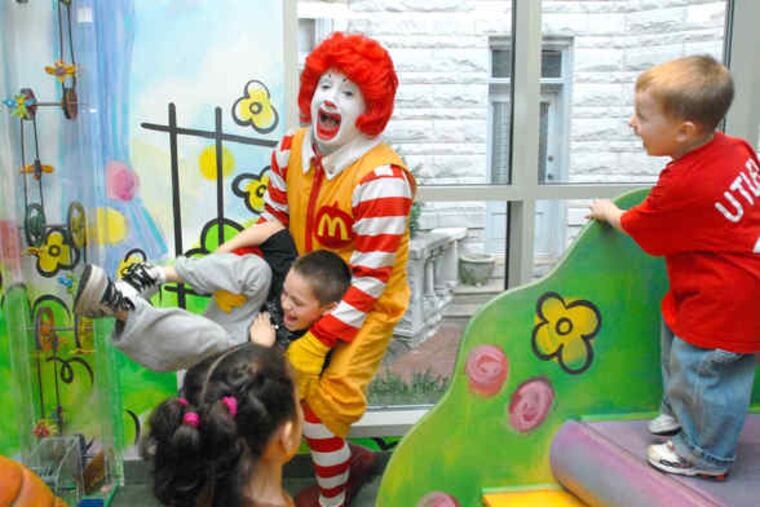Ronald McDonald House celebrates 35th year
Audrey Evans was a pediatric oncologist at Children's Hospital of Philadelphia in 1973 when she came up with a simple concept.

Audrey Evans was a pediatric oncologist at Children's Hospital of Philadelphia in 1973 when she came up with a simple concept.
"I wanted a home, like a glorified B&B, where the families of children with cancer could stay," Evans said.
With financial backing from the Philadelphia Eagles and the McDonald's Corp., she opened a modest boardinghouse Oct. 15, 1974, in a University City duplex at 40th and Spruce Streets.
It was the first Ronald McDonald House - and 288 of them now dot the globe.
"It was an instant success," Evans said, "because we gave total care for the families, not just the cancer."
Yesterday, surrounded by grateful children and parents, Evans celebrated its 35th anniversary.
With a red rose pinned to her crisp gray jacket, she recounted the project's beginnings.
While she was looking for a house, the Eagles were raising money to fight leukemia in support of Fred Hill, a former tight end whose daughter was being treated for the disease.
Evans, who is from Britain, was surprised when team officials came knocking at her door with a donation.
"When my secretary told me the Eagles wanted to see me and give me a check, I said, 'Who are they?' " Evans said.
The team presented her with $800,000 for the hospital.
"I gratefully accepted but said, 'What I really need is money for a house,' " she said. "So they turned around and found another $30,000."
A New Jersey contractor who had a daughter with leukemia rehabbed the property for free.
Mayor Frank Rizzo, McDonald's founder Ray Kroc, Eagles owner Leonard Tose, and a number of players attended the dedication.
The program moved in 1981 to the 19-room Swain family mansion on the 3900 block of Chestnut Street. In 1995, it swelled to 44 rooms when it annexed the former U.S. Healthcare building next door.
"It just grew and grew," Evans said, "but it's still not big enough to accommodate every family that needs a room."
Since opening, the Philadelphia house has served 30,000 families. Last year, a satellite house opened at Front Street and Erie Avenue in North Philadelphia, said Susan Campbell, executive director for the Philadelphia house.
Families are charged $15 a night for a room, Campbell said, but no one has been turned away if unable to pay.
Amy McLaughlin, 36, has been a guest in West Philadelphia since June. Her 6-month-old son, Ted, has Goldenhar syndrome, a birth defect that causes facial deformities, and has undergone four operations at Children's Hospital.
"Three days turned into three weeks, which turned into four months," said McLaughlin, of Hillsborough, N.J. "It would have been impossible to afford a hotel for this length of stay."
The guest rooms on the mansion side are "gorgeous and eclectic," many outfitted with king beds, TVs, and DVD players, McLaughlin said.
But the house provides more than accommodations, said her husband, Doug, 35.
"You're with other families who really understand what you're going through," he said. "We congregate in the kitchen at the end of the day and talk about what's going on with the kids. That's tied us all together."